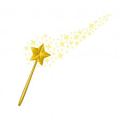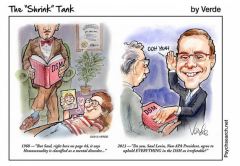 I’m giving the Smashwords.com version y1 a light dusting while I wait to get d4 back from my editor, and I came across the article from Newsweek science writer Sharon Begley that inspired a fair amount of my plot. Begley took a hard look at multiple studies and concluded that for those with mild to moderate depression, anitdepressants were just expensive candy. In fairness her full report is considerably more nuanced, and well worth reading. It raised her to hero status in my mind. Those who make a living writing for publications that rely on advertising will seldom be found telling uncomfortable truths about products sold in the same pages.
I’m giving the Smashwords.com version y1 a light dusting while I wait to get d4 back from my editor, and I came across the article from Newsweek science writer Sharon Begley that inspired a fair amount of my plot. Begley took a hard look at multiple studies and concluded that for those with mild to moderate depression, anitdepressants were just expensive candy. In fairness her full report is considerably more nuanced, and well worth reading. It raised her to hero status in my mind. Those who make a living writing for publications that rely on advertising will seldom be found telling uncomfortable truths about products sold in the same pages.
 As I reread her work today, a whole different aspect of her article struck me as odd. Placebos. What an odd concept. If you were doing a clinical study on the effectiveness of any medication, why not simply give half the people in the trial the medicine and tell the other half that they are not getting it. We all know why. People who think they are getting medicine sometimes get better based on belief alone. Real measurable illnesses can be cured by the power of belief, albeit not predictably or reliably. Of course that outcome needs to be removed from any study.
As I reread her work today, a whole different aspect of her article struck me as odd. Placebos. What an odd concept. If you were doing a clinical study on the effectiveness of any medication, why not simply give half the people in the trial the medicine and tell the other half that they are not getting it. We all know why. People who think they are getting medicine sometimes get better based on belief alone. Real measurable illnesses can be cured by the power of belief, albeit not predictably or reliably. Of course that outcome needs to be removed from any study.
Doesn’t this strike anyone else as incredibly strange? The entire medical community and bulk of society accepts that a placebo can cure a physical illness. You’d think somebody out there might be working to develop better and more effective placebos.
 As this line of reasoning wound its way through my brain, I realized that I already use a lot of placebos to stay healthy. I just don’t call them that. I call them vitamins, which I continue to take in spite of reading that they are a waste of money and the average person gets all the vitamins they need from their diet. I call them immunity boosters, the things I take to fight off a cold even though evidence of their effectiveness is dubious as well.
As this line of reasoning wound its way through my brain, I realized that I already use a lot of placebos to stay healthy. I just don’t call them that. I call them vitamins, which I continue to take in spite of reading that they are a waste of money and the average person gets all the vitamins they need from their diet. I call them immunity boosters, the things I take to fight off a cold even though evidence of their effectiveness is dubious as well.
Now that I think of it, my favorite placebo is a nice glass of red wine. Some might refer to this as self-medicating, but as far as I am concerned the wine is taken each evening to stave off heart problems. There is also the green tea I drink every day to ward off cancer (and because I like it) and the bit of dark chocolate I allow myself and oh yes the Greek yogurt that I love that does something, I forget what. Maybe calcium for my bones? I think I need to be taking something to improve my memory. Does anything involving caramel and salt improve brain function?
Seriously, none of these things in moderation are hurting me a bit and I’m willing to bet they are helping my general health a little, just maybe not to the degree I think they are. It doesn’t matter. I’m healthy as can be and have been so  for decades, and my firm belief that my indulgences and choices make me stronger is no doubt playing a part. The placebo effect is everywhere, not just in clinical trials. If used right, it’s a very good thing.
for decades, and my firm belief that my indulgences and choices make me stronger is no doubt playing a part. The placebo effect is everywhere, not just in clinical trials. If used right, it’s a very good thing.
Lately I’ve found myself thirsty at night and I’ve started keeping a glass of water on my nightstand. I’m also not sleeping as well as I used to (getting older does that) and I’ve convinced myself that better hydration is the solution. Wake up at 3 a.m.? Don’t think about the project at work or trying to sell the house or worry about the kids. Take a big drink of water and go back to sleep. Water does put you to sleep, you know. At least I think it does. Apparently, that is what matters.


